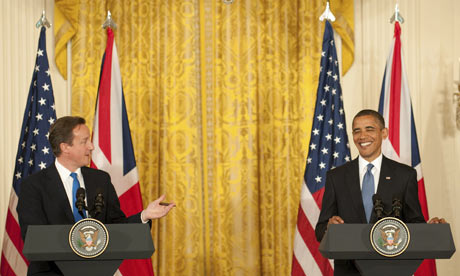WikiLeaks cables: Conservatives promised to run 'pro-American regime'
Leaked dispatch reveals how US diplomats are amused by Britain's 'paranoid' fears about so-called special relationship

Conservative party politicians lined up before the general election to promise that they would run a "pro-American regime" and buy more arms from the US if they came to power this year, the leaked American embassy cables show.
Despite British leaders' supportive stance, the dispatches also reveal – in what some will see as humiliating detail – how US diplomats in London are amused by what they call Britain's "paranoid" fears about the so-called special relationship.
One said the anxious British attitude "would often be humorous if it were not so corrosive" and that it was tempting to take advantage of this neurosis to "make London more willing to respond favourably when pressed for assistance". The UK was said to offer "unparalleled" help in promoting America's aims.
The incoming Conservatives appear to have made some wide-ranging offers of political co-operation with the US. The cables detail a series of private meetings with Tory frontbenchers, many of whom are now in the cabinet.
Liam Fox, now the defence secretary, promised to buy American military equipment, while the current foreign secretary, William Hague, offered the ambassador a "pro-American" government. Hague also said the entire Conservative leadership were, like him, "staunchly Atlanticist" and "children of Thatcher".
Fox met the US ambassador, Louis Susman, a year ago. In a 10 December 2009 cable marked "confidential", Susman recorded: "Liam Fox affirmed his desire to work closely with the US if the Conservative party wins power … adding that 'we (Conservatives) intend to follow a much more pro-American profile in procurement'."
He reportedly went on: "Increasing US-UK 'interoperability is the key' since the US and UK will continue to fight together in the future" and "expressed confidence regarding US leadership in Afghanistan and optimism about the way forward".
The frontbencher admitted that there was an opposed faction within Tory ranks. "Fox asserted that some within the Conservative party are less enthusiastic, asserting that 'we're supposed to be partners with, not supplicants to, the United States'. Fox said he rebuffed these assertions, and he welcomed the ambassador's reassurance that senior US leaders value the UK as an equal partner."
Hague pledged his own loyalty in an earlier meeting with the US deputy chief of mission, Richard LeBaron. A confidential cable marked "no foreigners" from 1 April 2008 records: "The deputy chief of mission asked Hague whether the relationship between the UK and the US was 'still special'. Hague said he, David Cameron and George Osborne were 'children of Thatcher' and staunch Atlanticists … For his part, said Hague, he has a sister who is American, spends his own vacations in America and, like many similar to him, considers America the 'other country to turn to'.
"Asking his senior adviser her views, [Arminka] Helic (who is Bosnian), said: 'America is the essential country.'
"Hague said whoever enters 10 Downing Street as prime minister soon learns of the essential nature of the relationship with America. He went on: 'We want a pro-American regime. We need it. The world needs it.' "
These enthusiastic approaches came against a backdrop of what American officials termed British "paranoia" following the arrival of Barack Obama as an unknown presidential quantity.
In a lengthy classified dispatch in February 2009 headed "The British ask, is our special relationship still special in Washington?"
LeBaron wrote: "More than one HMG senior official asked embassy officers whether President Obama meant to send a signal in his inaugural address about US-UK relations by quoting Washington during the revolutionary war [against Britain], while the removal of the Churchill bust from the Oval office consumed much UK newsprint."
The Times had written, allegedly quoting British embassy sources in Washington, about the distress caused by the removal of the bust, lent to George Bush by Tony Blair from the UK government art collection, in happier times. It was headlined: "Churchill bust casts shadow over special relationship".
LeBaron noted dryly: "This period of excessive UK speculation about the relationship is more paranoid than usual … This over-reading would often be humorous, if it were not so corrosive."
He advised against taking advantage of British neuroses and said the UK remained highly useful to the US because of its "unparalleled" help in promoting America's aims. "Though tempting to argue that keeping HMG off balance about its current standing with us might make London more willing to respond favourably when pressed for assistance, in the long run it is not in US interests to have the UK public concluding the relationship is weakening, on either side.
"The UK's commitment of resources – financial, military, diplomatic – in support of US global priorities remains unparalleled; a UK public confident that the USG values those contributions and our relationship, matters to US national security."
Britain's willingness to invest in expensive weaponry is a key part of the so-called special relationship. The UK's annual military budget is running at £37bn a year.
Fox's reference to more procurement from the US shows his zest for heavy spending on two future big-ticket items – the joint strike fighter [JSF], and the £20bn replacement for the Trident nuclear weapons system. The largely US-built JSF will be formidably expensive, and the original scheme was for Britain to buy up to 138 of them at £150m each, to go on giant aircraft carriers.
Fox is having an uphill fight: the recent defence review promised only to buy a cheaper version, and to cut the numbers of planes.
Some are urging the purchase of US-made drones instead: the Ministry of Defence recently announced the purchase of 100 small Desert Hawk III drones and five extra Reaper killer drones. Other US purchases may be in the pipeline.
Frustratingly perhaps for Fox, decisions on the Trident replacement scheme, which will rely on submarine-launched ballistic missiles leased from the US, have been delayed until after the next election.
